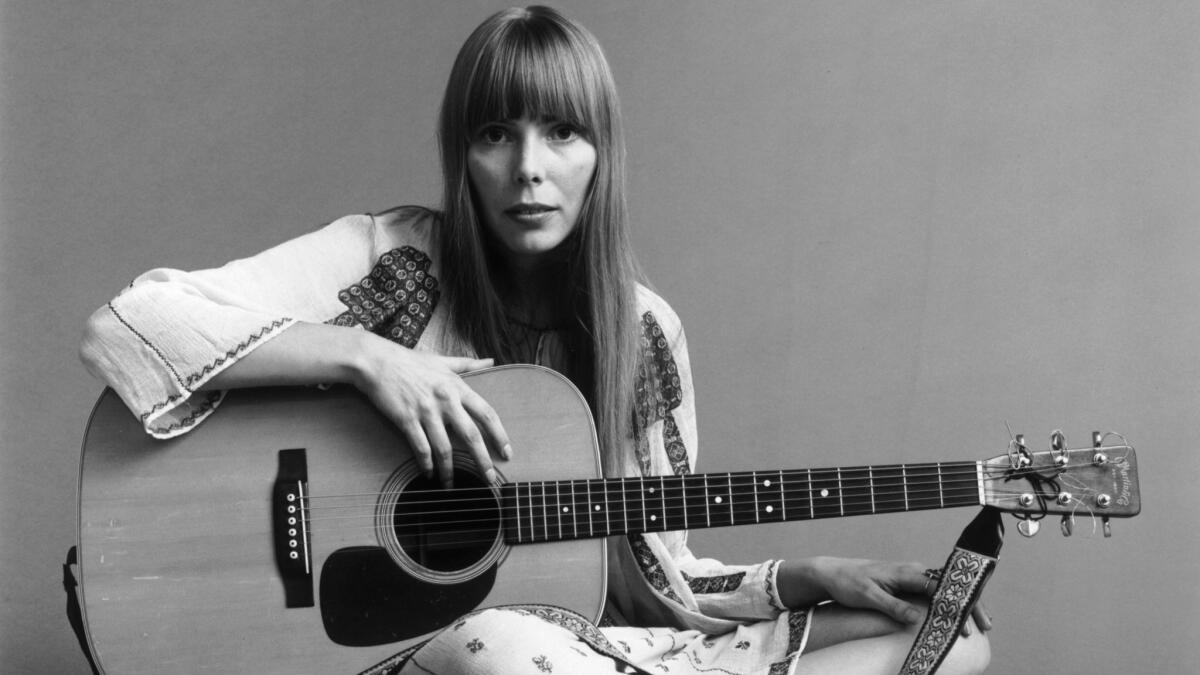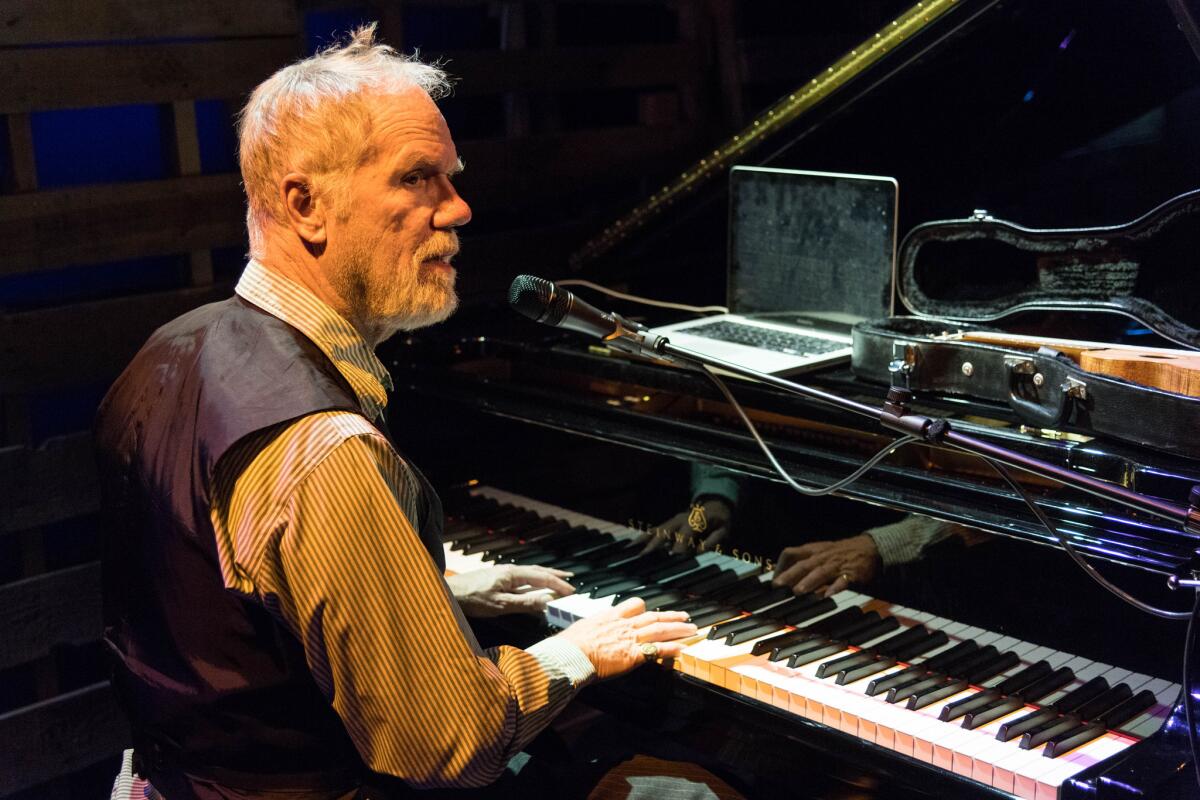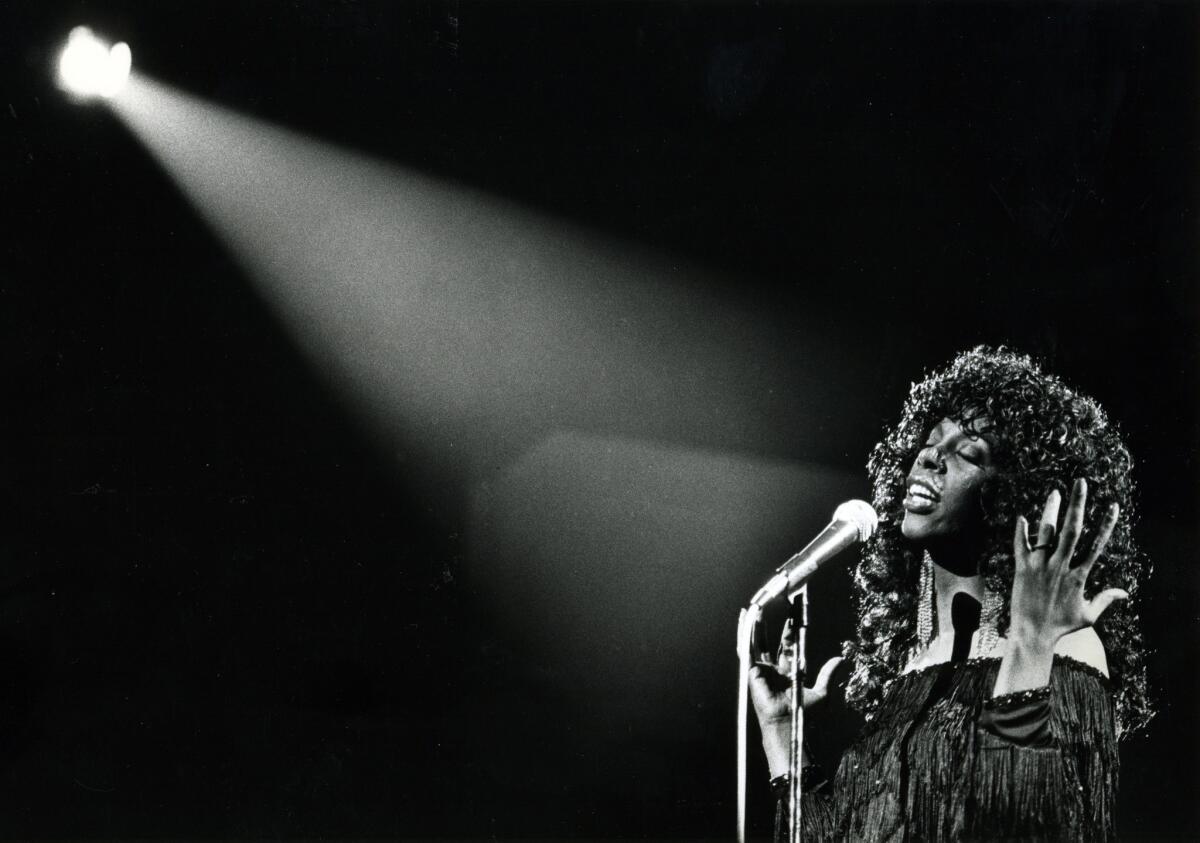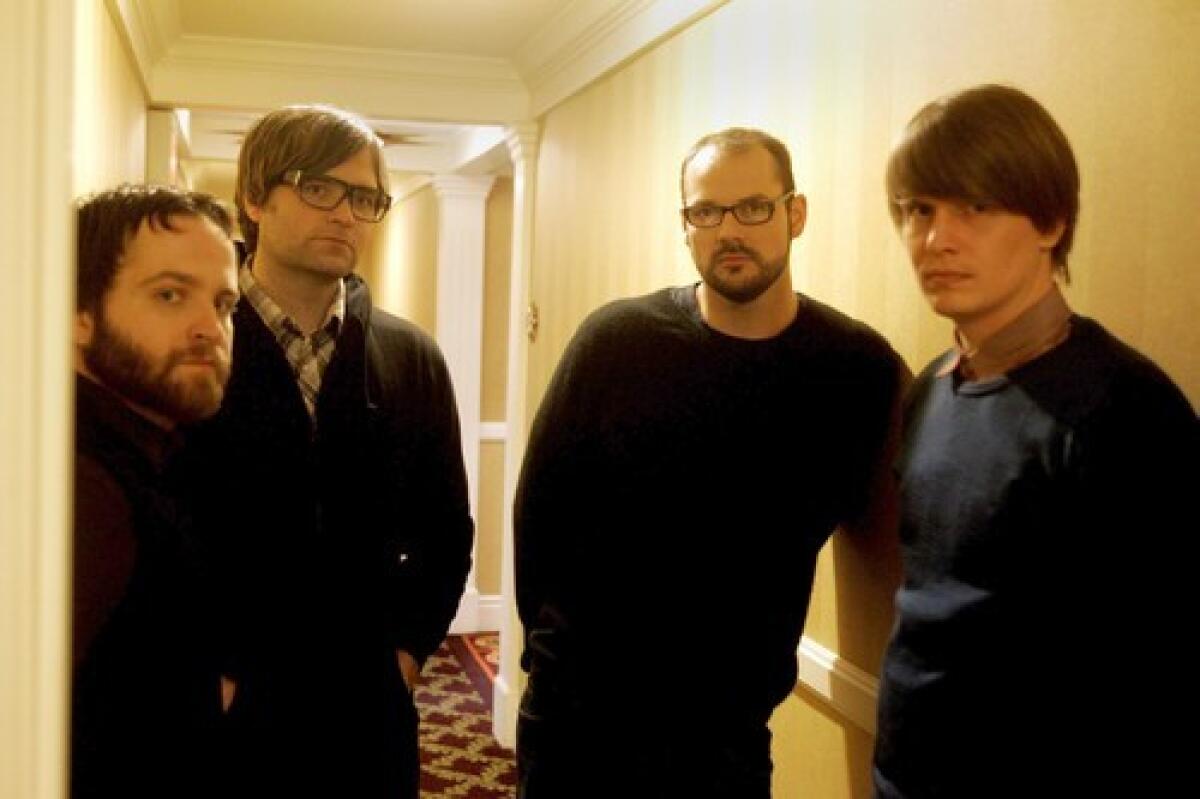Thousands of songs have been written about L.A. Here are 25 sure-fire classics
- Share via
Despite the volume and variety of lyrical references, a Google search of “songs about L.A.” invariably turns up the same dozen songs, “I Love L.A.,” “Straight Outta Compton,” “Free Fallin’” and “All I Wanna Do” among them.
Many are essential characterizations, but these songs’ ubiquity wrongly suggests they’re so imaginatively rendered that they eclipse the thousands of other songs set in Southern California. At this point, these classics gum up efforts to build a new list of crucial music about contemporary Los Angeles, which is what the Times is attempting to do with a project called “50 Songs for a New L.A.”
The project features essays, interviews, portraits and quick primers on the past 25 years’ worth of crucial songwriting about the city.
As a way to further a new conversation about representing Los Angeles in song without having to repeat others’ work, The Times has constructed a kind of virtual Hall of Fame of Los Angeles songs. Hardly all-encompassing, the list below corrals the aforementioned classics into a separate category. Think of it as “The 25 Songs You Already Know Are About Los Angeles.”
Limited to work starting in 1969 and running through the early ’00s — which is the era that opens the “50 Songs for a New L.A.” list — these 25 songs helped define the sound of the city at the end of one century and the beginning of the next. When possible, we’ve attempted to include interviews with artists recalling the inspiration behind the songs, as well as contemporaneous reports culled from The Times’ archives.
Flying Burrito Bros., “Sin City” (1969)
Key lyric: “The scientists say / It will all wash away / But we don’t believe any more / ’Cause we’ve got our recruits / And our green mohair suits / So please show your ID at the door / This old earthquake’s gonna leave me in the poor house / It seems like this whole town’s insane / On the 31st floor a gold-plated door / Won’t keep out the Lord’s burning rain.”
Flying Burrito Bros. co-founder and former Byrds member Chris Hillman told The Times in 2007 that he and his then-roommate Gram Parsons wrote the song in a half-hour one morning over coffee. They were living in a rented house near Ventura Boulevard, and the opening lines came to Hillman as he was waking up.
The songwriter called it a warning to L.A. newcomers, citing “people like Gene Clark from the Byrds, who came here from Kansas with all that talent and all bright-eyed and talented and idealistic, and the whole thing just swallowed him up.” Hillman said “Sin City” was, in part, inspired by the Byrds’ issues with former manager Larry Spector. “Spector was a thief, it was as simple as that. And his condo, he lived on the 31st floor behind this awful, garish gold door.”
Elton John, “Tiny Dancer” (1971)
Key lyric: “Blue jean baby, L.A. lady / Seamstress for the band / Pretty-eyed, pirate smile / You’ll marry a music man / Ballerina, you must’ve seen her / Dancing in the sand / And now she’s in me, always with me / Tiny dancer in my hand / Jesus freaks out in the street / Handing tickets out for God / Turning back, she just laughs / The boulevard is not that bad.”
In 1970, John earned his first national attention in Los Angeles when he tore through a string of shows at the Troubadour in West Hollywood. Famously, John credits The Times’ then pop music critic, Robert Hilburn, whose rave review helped boost the artist’s trajectory. The superstar songwriter has been connected to the city ever since. His longtime lyricist, Bernie Taupin, set this classic ballad on Sunset Boulevard, as well as the beach at the boulevard’s western edge. John introduced “Tiny Dancer” to the world at the Greek in 1971.
“For the opening hour, it was just John alone at the piano, and he introduced five new songs that night, including ‘Tiny Dancer,’” Hilburn wrote of John’s Sept. 6 show at the amphitheater. Said John to Hilburn, on playing Los Angeles: “Of all the outdoor venues in the country, L.A. has two of the best in the Hollywood Bowl and the Greek. The sound at each is very true, and they both have such lovely settings.”

Joni Mitchell, “California” (1971)
Key lyric: “I met a redneck on a Grecian isle / Who did the goat dance very well / He gave me back my smile / But he kept my camera to sell / Oh, the rogue, the red red rogue / He cooked good omelets and stews / And I might have stayed on with him there / But my heart cried out for you, California / Oh, California, I’m coming home / Oh, make me feel good, rock ’n’ roll band / I’m your biggest fan / California, I’m coming home”
“This year I took some time off from touring and went off on some adventures of my own, and this is kind of a letter back home,” Mitchell told a crowd in 1970 during a televised performance. “The first verse I wrote in Paris and the next verse I wrote in Spain and the last verse I wrote when I got home again.” The result, taken from Mitchell’s album “Blue,” is one of the great love letters to the region.
Los Tigres del Norte, “Contrabando y Traición” (1972)
Key lyric: “A Los Angeles llegarón / A Hollywood se pasaron / En un callejón oscuro / Las cuatro llantas cambiarón / Ahí entregarón la hierba / Y ahí también les pagarón.”
Spanish-language songs about the L.A. experience are frustratingly under-represented on most lists about the city, including this one. That’s a whole other project, but it’s safe to say that Los Tigres’ “Contrabando y Traición” would rank near the top of any list. The work, wrote The Times’ Carolina Miranda in 2018, “established Los Tigres’ reputation as a band worth listening to. And it helped inspire the entire genre of narcocorridos (ballads about drug trade).”
The song’s narrative, about a pair of lovers who smuggle weed from San Ysidro to Hollywood, was even turned into a telenovela on Telemundo. “Hollywood has a very important significance for us,” bassist Hernán Hernandez told Miranda.
The Kinks, “Celluloid Heroes” (1972)
Key lyric: “You can see all the stars as you walk down Hollywood Boulevard / Some that you recognize, some that you’ve hardly even heard of / People who worked and suffered and struggled for fame / Some who succeeded and some who suffered in vain.”
Ray Davies to the Times’ Geoff Boucher in 2007, on Davies’ time living in Hollywood: “I saw what a poetically tragic place it is. ... It’s all there. It’s all on that street. You could be so successful one day and completely forgotten the next. The poison chalice: fame.” Of the Hollywood Walk of Fame, Davies added, “Here is a place that celebrates stars but then you can walk right on them.”
David Bowie, “Cracked Actor” (1973)
Key lyric: “You caught yourself a trick down on Sunset and Vine / But since he pinned you, baby, you’re a porcupine / You sold me illusions for a sack full of checks / You’ve made a bad connection ’cause I just want your sex / Crack, baby, crack, show me you’re real / Smack, baby, smack, is that all that you feel?”
In the autumn of 1972, Bowie and his band took a two-week break from touring and stayed with a 46-person entourage at the Beverly Hills Hotel. He wrote “Cracked Actor,” about a failed thespian, sometime during the stay. Bowie expert Chris O’Leary writes in his book, “Rebel Rebel: David Bowie Song by Song,” that the artist and posse “spent afternoons by the pool, nights at Rodney’s English Disco on the Sunset Strip, charged limousines to their rooms. To complete the L.A. experience, some took a course at the Scientology Celebrity Centre. ... By the time they left L.A., Bowie and company had racked up a $20,000 hotel bill.”

Loudon Wainwright III, “Hollywood Hopeful” (1975)
Key lyric: “I am a full-fledged, grown-up adult / I’m trying make a dent, trying to get a result / I’m holed up in a Hollywood hotel suite / Tequila to drink and avocado to eat / They got all kinds of victories and lots of downfalls / They got drugs in the rugs and ghosts in the walls / Starlets in the lobby that can make a man drool / Blood on the curtains and a phone by the pool.”
Last year, Wainwright recalled to The Times the circumstances that led to his song, written when he was a few months shy of 30 years old. “I was living at the Château [Marmont]. In those days, it was affordable,” he said. “I’ve had stays in other hotels in L.A. In Hollywood, I used to stay at the Tropicana, and for a while I was at the Sunset Marquis. But I lived a couple months at the Château.
“At the time, I was [promoting] my third record for Columbia. I’d also been hired to be in the television show ‘M*A*S*H.’ I was living at the Château by myself, and was in a separation from my then-wife, Kate McGarrigle. So I was pretty much alone. Well, I was dating, you could say.” Asked whether, as the artist sang in the “Hollywood Hopeful” lyrics, he ever did get his own billboard on Sunset Boulevard, Wainwright said, “I never sold enough records to get a billboard.” He added with a laugh, “Not yet, anyway. There’s still a little time.”
Warren Zevon, “Desperados Under the Eaves” (1976)
Key lyric: “I was sitting in the Hollywood Hawaiian Hotel / I was staring in my empty coffee cup / I was thinking that the gypsy wasn’t lying / All the salty margaritas in Los Angeles / I’m gonna drink ’em up / And if California slides into the ocean / Like the mystics and statistics say it will / I predict this motel will be standing until I pay my bill.”
Zevon to The Times in 1976: “I think in songs that are supposed to have a wry or a humorous twist, I’m trying to remind myself not to take myself too seriously. But it has been stressed to the point where certain writers seem to see me as a comedian or something … a kind of extreme satirist, which I don’t see at all. I’m very much not a cynic I think, actually, then I’m quite idealistic.”
Bob Seger, “Hollywood Nights” (1978)
Key lyric: “She took his hand and she led him along that golden beach / They watched the waves tumble over the sand / They drove for miles and miles up those twisting, turning roads / Higher and higher and higher they climbed / And those Hollywood nights / In those Hollywood hills / She was looking so right / In her diamonds and frills.”
“I was out in Los Angeles and I was just beginning to record ‘Stranger in Town,’” Seger told the website Rock Cellar earlier this year. “I had a house out in the Hollywood Hills just above La Cienega on Miller above the Sunset Strip. I could see the city from my house. I’d be driving up there in the Hollywood Hills, just driving along and then suddenly [recites lyrics], ‘Hollywood nights, Hollywood Hills, above all the lights, Hollywood nights.’ It just came right into my head.”

Donna Summer, “Sunset People” (1979)
Key lyric: “Late-night flight, LAX / Limousine and you’re all set / For Sunset, for Sunset / Riot house, a penthouse suite / The street’s alive beneath your feet.”
Summer on her song, “Sunset People,” and her first time visiting Los Angeles: “It was like going to Las Vegas but better. All these people on the street, walking, talking, profiling ... I thought I had died and gone to heaven.” She added of the hit, “That’s the thing about that song, it had the pulse of a car cruising. And cruising is what you do on Sunset, right? To see and be seen, that’s Sunset.”
Steely Dan, “Babylon Sisters” (1980)
Key lyric: “Drive west on Sunset to the sea / Turn that jungle music down / Just until we’re out of town / This is no one-night stand / It’s a real occasion / Close your eyes and you’ll be there / It’s everything they say / The end of a perfect day / Distant lights from across the bay.”
“Our world was confined to the ABC-Dunhill building on Beverly Boulevard, at least for the first few years,” Steely Dan’s Donald Fagen told writer Barney Hoskyns in 2003, of the band’s first visits to L.A. from New York. “We had a little office with a piano there, where we were supposedly writing our canon of pop hits. There were lot of transplanted New York Jews and blond secretaries there. It still had that kind of Lenny Bruce-esque Yiddish dirtiness about it.”
Added Walter Becker: “We were shut-ins, it’s just that instead of being shut in our homes with meals on wheels we were in recording studios with takeout food.”
X, “Los Angeles” (1980)
Key lyric: “She gets confused / Flying over the dateline / Her hands turn red / ’Cause the days change at night / Change in an instant / The days change at night / Change in an instant / She had to leave Los Angeles / She found it hard to say goodbye to her own best friend / She bought a clock on Hollywood Boulevard the day she left.”
One of the great anthems (indictments?) of the city, the eponymous song on punk band X’s debut album opens with a line both simple and timeless: “She had to leave Los Angeles.” Sung by the band’s John Doe in a tag-team tirade with Exene Cervenka, the urgent narrative about an intolerant insider fed up with the city’s multiculturalism burns with energy.
“We make a minimal separation between our real lives and what we do onstage,” X’s John Doe told The Times’ Kristine McKenna in 1979. “There’s a lot of unhappiness and anger in our songs, but we take bad experiences — and everyone has them — and transform them into forceful music. Kind of like ‘A Streetcar Named Desire’ — that’s a very bleak piece of work, but you can’t deny that it’s also passionate and exciting.”
Moon Unit Zappa, “Valley Girl” (1982)
Key lyric: “She’s a Valley girl / In a clothing store / Okay, fine, Fer sure fer sure / She’s a Like, oh my God! / Like, totally! / Encino is, like, so bitchin’ / There’s, like, the Galleria / And, like, all these, like, really great shoe stores.”
Moon Unit Zappa, on the typical San Fernando “Valley girl” of the early ’80s, to the Times in 1982. “She’s got on a ruffled blouse and doesn’t need to wear a bra underneath because the ruffles cover up anything that could possibly be exposed. ... She’s got feathered hair or the new shag look — the one where it sticks up on top and then fluffs out on the sides. She has a headband on and gold leaf earrings.”
Randy Newman, “I Love L.A.” (1983)
Key lyric: “Roll down the window, put down the top / Crank up the Beach Boys, baby / Don’t let the music stop / We’re gonna ride it till / We just can’t ride it no more / From the South Bay to the Valley / From the West Side to the East Side / Everybody’s very happy / ’Cause the sun is shining all the time / Looks like another perfect day / I love L.A. (we love it).”
“I’ve tried at times to get rid of it but I always take it back,” Newman told the Times regarding his lyrical love letter to the city. “There are other songs I have done that I think are more meaningful to me but, hey, I’ll take it. And I think people do get the irony of the song. Maybe not when they’re driving 70 miles an hour down the freeway in a convertible or singing it at a playoff game. But they get the tone. People are smiling when they sing it, and I think they’re smiling for the right reasons.”
Shalamar, “Don’t Get Stopped in Beverly Hills” (1984)
Key lyric: “Don’t get stopped in Beverly Hills / You better walk soft in Beverly Hills / Don’t get wild in Beverly Hills / You gotta have style in Beverly Hills / You look around thinking your number’s up / You see the lights flash in your eyes / It’s going down louder than thunder / You’re shaking hard, thinking those lies.”
From the perspective of popularity, this synth-funk track from the Eddie Murphy comedy “Beverly Hills Cop” is hardly in the pantheon. But in its own way, “Don’t Get Stopped in Beverly Hills” was a protest song, a not-so-subtle indictment of the police’s practice of stopping commuters cruising through the tony town for little more than driving while black. As delivered by then-Shalamar lead singer Jody Watley, the song addressed, in its own subtle way, the racial disharmony that plagued the region in the early ’90s.
“There’s always been a difference made, as far as Beverly Hills and the rest of the city, all the way down to Rodeo Drive. In the ’hood it’s ‘Rodeo Drive’ but in Beverly Hills it’s ‘Ro-DAY-o,’” Howard Hewitt said last year. The former Shalamar member and platinum solo artist moved to Inglewood from Ohio in the mid-1970s with $34 in his pocket. Hewitt eventually got an apartment on Fountain Avenue in West Hollywood, which borders Beverly Hills. In fact, one of the artist’s first bands was called Beverly Hills.
Not too long after moving to L.A., Hewitt and his cousin were cruising in his Monte Carlo and, after eating at a Mid-City McDonald’s, decided to explore. “We’re two young black men riding through Beverly Hills in a car with out-of-state license plates on it,” Hewitt says, laughing.
His cousin, who was driving, soon noticed a police car trailing them. Before Hewitt could act, the police turned on the lights and pulled them over. As luck would have it, the stop was interrupted by a more urgent matter, and the two were let off with a warning. Says Hewitt: “We went straight back to Inglewood.”

Cheech Marin, “Born in East L.A.” (1985)
Key lyric: “I crawled under barbed wire, swam across a stream / Rode in six different trucks packed like a sardine / Walked all day in the burning sun / Now I know what it’s like to be born to run / Up ahead was the promised land / Shining like a star just beyond my hand ... I was born in East L.A.”
“The thing came out like a combination of ‘Born in the U.S.A.,’ ‘I Love L.A.,’ ‘El Norte’ and a Coasters tune,” Marin told The Times in 1985. According to the article, the inspiration for the song came “after reading a story in The Times about a local boy who was accidentally deported because of his lack of command of the English language.”
N.W.A, “Straight Outta Compton” (1988)
Key lyric: “So when I’m in your neighborhood, you better duck / ‘Cause Ice Cube is crazy as f— / As I leave, believe I’m stompin’ / But when I come back, boy, I’m coming straight outta Compton.”
N.W.A’s MC Ren, in Jonathan Gold’s 1989 N.W.A profile for L.A. Weekly. “[W]hen we put this ... out on video and on records, ain’t nobody want to see this. .... The video ain’t half of a half of what go on for real. It’s just a little sweep, no guns. MTV’s into all that crazy devil-worshipping. … To me there’s more violence on a ... cartoon than in our music. Little kid see a cartoon character with a gun, he going to want to carry a gun, right? GI Joe, all that. ... But they aren’t even playing our video on the MTV rap show.”
Tom Petty, “Free Fallin’” (1989)
Key lyric: “All the vampires, walkin’ through the Valley / Move west down Ventura Boulevard / And all the bad boys are standing in the shadows / And the good girls are home with broken hearts / And I’m free, I’m free fallin’.”
In 1988, Tom Petty and producer Jeff Lynne were in the studio writing songs when Petty, playing a keyboard, offered a version of the opening riff. “I think Jeff said something like, ‘That’s a really good riff but there’s one chord too many,’” Petty told Billboard in 2016. “I think I cut it back a chord and then, really just to amuse Jeff, honestly, I just sang that first verse. Then he starts laughing.”
Petty was headed to the chorus when Lynne leaned over “and said the word ‘free-falling.’” After playing with the vocal melody and phrasing, they locked in the chorus. “[W]e both knew at that moment that I’d hit on something pretty good,” Petty concluded.
A Tribe Called Quest, “I Left My Wallet in El Segundo” (1990)
Key lyric: “Hands go in my pocket, I can’t speak / Hopped in the car and torped to the shack / Of Shaheed, we gotta go back / When he said ‘Why?’ I said we gotta go / ‘Cause I left my wallet in El Segundo.”
According to rapper Q-Tip in the documentary “Beats, Rhymes & Life,” setting the group’s anthem in ’Gundo was drawn from the sitcom “Sanford and Son.” Redd Foxx’s character, Fred Sanford, said Q-Tip, “always be like, ‘Esther! I’ma leave you in El Segundo!’ ... He always made El Segundo references.” When A Tribe Called Quest recorded the song, the group’s Jarobi added, “We thought it was some imaginary shit. What the ... is an El Segundo?”
Los Lobos, “The Neighborhood” (1990)
Key lyric: “Mother works at a 9-to-5 / Hardly makes enough to keep alive / She bows her head with tears in her eyes / Thank you, Lord, for another day / Help my brother along his way / Please bring peace to the neighborhood, to the neighborhood.”
“It’s a funny place, kind of in the middle of nowhere,” Los Lobos’ Louie Perez told The Times in 1990, of the neighborhood where he was raised, near the intersection of Brooklyn and Eastern avenues in East L.A. “It has always been that way as far as the gangs were concerned. They kind of left this area alone because it was like nobody’s territory. ... It was never a completely peaceful place, but it was this little island when I was growing up.”
Snoop Doggy Dogg, “Gin & Juice” (1993)
Key lyric: “With so much drama in the LBC / It’s kind of hard being Snoop D-O-double-G / But I, somehow, some way / Keep coming up with funky-ass shit, like, every single day / May I kick a little something for the G’s? / And make a few ends as I breach through?”
“Momma was a cold drinker in the ’70s,” Snoop Dogg told Thrillist in 2017 during a rollout for a famous brand of gin the rapper was promoting, on the origin of his cruising classic. “They used to have parties at the house in the living room with a bar, with the 8-track cassette player. They be drinking their Tanqueray and having a good time and partying.” A quarter-century later, the Dr. Dre-produced anthem has become a standard, one that’s been covered by artists including Kelly Clarkson, Panic at the Disco, the Gourds and Paul Simon.
Sheryl Crow, “All I Wanna Do” (1993)
Key lyric: “All I wanna do is have some fun / I got a feeling I’m not the only one / All I wanna do is have some fun / I got a feeling I’m not the only one / All I wanna do is have some fun / Until the sun comes up over Santa Monica Boulevard.”
In a 1995 interview with The Times, Sheryl Crow called her breakout song “an anti-routine, anti-stuck-in-a-rut song. Wouldn’t it be great if I didn’t have to show up at work today? Like getting in your car and just not showing up for months? Everybody thinks of it and nobody does it, and that’s pretty much what the character in the song does.”
2Pac featuring Dr. Dre, “California Love” (1995)
Key lyric: “Your city is the bomb if your city makin’ pay / Throw up a finger if you feel the same way / Dre puttin’ it down for Californ-i-a / California knows how to party / In the city of L.A. / In the city of good old Watts / In the city, the city of Compton / We keep it rocking.”
Tupac Shakur in a 1995 MTV interview with Kurt Loder, on creating “California Love” with Dr. Dre: “I was like, Dr. Dre, I want some beats right now. Dr. Dre, you owe me this. I’m new on Death Row, fresh out of jail. So you ain’t going to be finishing your album anytime soon. He was like, ‘All right.’”
Replied Dr. Dre: “I had the song done but I didn’t have an album done for it to come out on, so we’re putting it on his album. ... I love collaborating — especially collaborating with creative people who as talented as Pac.”

Death Cab for Cutie, “Why’d You Want to Live Here?” (2001)
Key lyric: “I’m in Los Angeles today / It smells like an airport runway / Jet fuel stenches in the cabin / And lights flickering at random / I’m in Los Angeles today / Garbage cans comprise the medians / Of freeways always creeping / Even when the population’s sleeping / And I can’t see why you’d want to live here.”
“An anti-L.A. song? Well, I’ve never seen it that way,” Death Cab for Cutie singer Ben Gibbard told The Times in 2007. “This song is a conversation. It’s a lover trying to convince his loved one not to move to L.A. He’s saying anything he can think of. It could be anywhere she’s going, it just happens to be L.A.”
The Decemberists, “Los Angeles, I’m Yours” (2003)
Key lyric: “And as it tells its sorry tale / In harrowing detail / Its hollowness will haunt you / Its streets and boulevards / Orphans and oligarchs / And here’s a plaintive melody / A truncated symphony / An ocean’s garbled vomit on the shore / Los Angeles, I’m yours.”
Tweed-rock band the Decemberists’ singer and songwriter Colin Meloy on his first impression of L.A.: “I couldn’t stand the place,” he told The Times in 2007. The resulting song was an indictment, yet when the Decemberists played the song at concerts here, Meloy said, “It was so strange to look out and people were just gleefully shouting back the lines about their city of choice being compared to vomit on the shore. We tapped into something.”
What songs are we missing, let us know
More to Read
The biggest entertainment stories
Get our big stories about Hollywood, film, television, music, arts, culture and more right in your inbox as soon as they publish.
You may occasionally receive promotional content from the Los Angeles Times.










